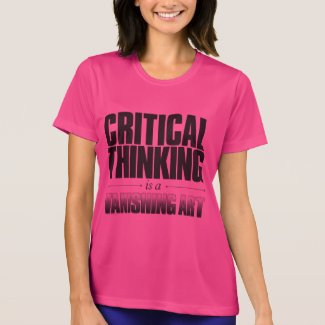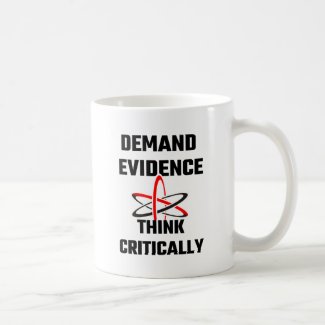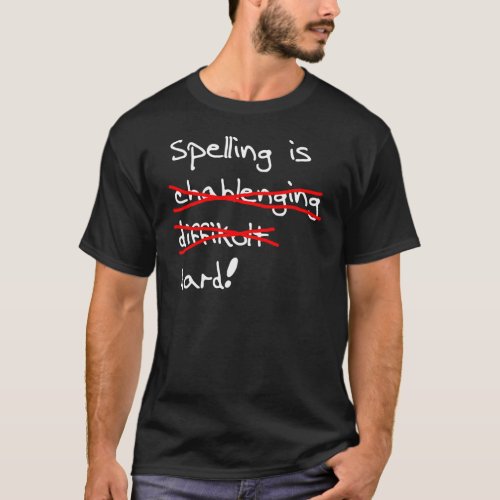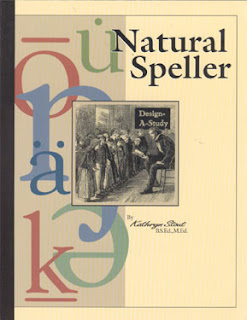What Ever Happened to Critical Thinking in Education?
As we look around our American universities and the streets of many cities, we see that many people no longer care about critical thinking or examining any opposing opinions. In fact, you don't have to look any farther than social media to see that. Yet schools used to teach logic and critical thinking. As recently as a few years ago, when I was still selling books online, my best seller was a small flip chart: Quick Flip Questions for Critical Thinking. Recently, its publisher, Edupress, sold its educational supply business to another supplier. Fortunately, it's still available for home, school, and business use.
 |
| Top Selling Critical Thinking Aid for Students, Educators, Writers, and Speakers Collage of my scans edited on PicMonkey |
When I Was Still Selling Teaching Resources Directly, This Flew Off My Shelves and I Shipped It All Over the Country.
Several years ago when I got my Edupress dealer catalog, it had a new item in it -- a small chart called Quick Flip Questions for Critical Thinking. I decided to try a few of them and listed it in my catalog.
The results amazed me. It quickly became a best seller. Large school districts were ordering it in volume so they could give one to every teacher in the district. I discovered that education professors were giving workshops and recommending that everyone in the workshops buy this little chart.
Why is this inexpensive little chart so valuable to educators?
 This handy chart, which is easily held in one hand, started a stampede of educators to get it because it took the work of Benjamin Bloom and made it easy to understand and refer to. Quick Flip Questions for Critical Thinking was the work of Linda G. Barton, who based it on the original Bloom’s Taxonomy.
This handy chart, which is easily held in one hand, started a stampede of educators to get it because it took the work of Benjamin Bloom and made it easy to understand and refer to. Quick Flip Questions for Critical Thinking was the work of Linda G. Barton, who based it on the original Bloom’s Taxonomy.
This little spiral bound chart can be held in the hand while teaching a class or leading a discussion. It doesn’t take up much room on a teacher’s desk when he or she is planning a lesson or writing a test. As you can see in the photo to the left, it has a separate page for each level of thinking in the cognitive domain. If a teacher wants to make sure her test or discussion questions and lesson plans cover each level, all she has to do is flip from page to page.
Do you know someone who needs it?
This Mug Will Remind You or Someone Else to Think Critically
Do you know someone who needs it?
As you can see in the picture below, each page is easy to flip open. On the other side of the page you open is a definition of the level of knowledge that page covers — in this case, Comprehension. Under the definition is a list of keywords — verbs– that tell how one would demonstrate mastery of this level of knowledge: eg. classify, explain, outline, summarize, etc. Under the spiral are open-ended questions that students would need comprehension to be able to answer.
This little chart is so useful it finds its way into the hands of workshop leaders, Bible discussion leaders, and even writers. Why writers? It helps them organize writing, and its questions can also act as writing prompts when writer's block attacks. The questions can encourage you to take your topic in a new direction.
A New Flip Chart Appears
Quick Flip Questions for Critical Thinking was so popular that more flip charts were introduced. People loved the original Quick Flip Questions for Critical Thinking but had also been requesting an updated version. Before long, it was followed by Quick Flip Questions for the Revised Bloom’s Taxonomy. While it was still new, I sold more of these than of the original flip chart. But soon others discovered what I already knew -- this dirty little secret.
There is nothing new in this updated version. The words for the headings have been changed, but "Creating" has the same material as "Synthesis" had in the original version, and everything else that appears different is just in a different order. The levels of the cognitive domain of learning have been divided by the authors into these levels: Remembering, Understanding, Applying, Analyzing, Evaluating, and Creating.
Either of these handy resources helps one improve thinking skills at any age with the flip of a page. Either is an indispensable tool that helps teachers write lesson plans, master Bloom's Taxonomy, and develop higher levels of thinking. It will help students develop analytic skills. They will learn to ask their teachers the right questions and to see through some of the nonsense they will find in their social media feeds.
There are many ways to use the flip charts in families. They can even help improve child/parent communication. There are both threatening and non-threatening ways to ask questions. If it's your words which put children in a defensive stance (not your tone of voice), this resource can help you frame your questions in a way that may not raise the same barriers to communication. (I would not hold the book in your hand for these encounters. Learn the most useful questions and keep them in your head.)
Homeschoolers will also find these charts valuable. I still like the original version best. Home educators should get a copy for each child of middle school age and older. When the parent assigns reading she can also have the children answer one or two Level IV-VI questions orally or in writing afterward. After the family watches a video, TV commercial, or show together, maybe one of these Level IV and VI Questions would be appropriate to discuss together at the end:
There is nothing new in this updated version. The words for the headings have been changed, but "Creating" has the same material as "Synthesis" had in the original version, and everything else that appears different is just in a different order. The levels of the cognitive domain of learning have been divided by the authors into these levels: Remembering, Understanding, Applying, Analyzing, Evaluating, and Creating.
Either of these handy resources helps one improve thinking skills at any age with the flip of a page. Either is an indispensable tool that helps teachers write lesson plans, master Bloom's Taxonomy, and develop higher levels of thinking. It will help students develop analytic skills. They will learn to ask their teachers the right questions and to see through some of the nonsense they will find in their social media feeds.
How to Use the Flip Charts at Home
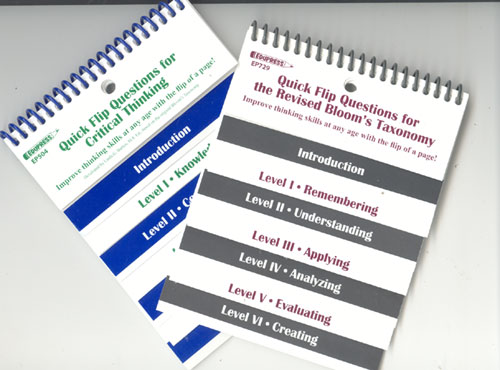 |
| You Can Even Use the Flip Charts at Home Photo © B. Radisavljevic |
There are many ways to use the flip charts in families. They can even help improve child/parent communication. There are both threatening and non-threatening ways to ask questions. If it's your words which put children in a defensive stance (not your tone of voice), this resource can help you frame your questions in a way that may not raise the same barriers to communication. (I would not hold the book in your hand for these encounters. Learn the most useful questions and keep them in your head.)
Homeschoolers will also find these charts valuable. I still like the original version best. Home educators should get a copy for each child of middle school age and older. When the parent assigns reading she can also have the children answer one or two Level IV-VI questions orally or in writing afterward. After the family watches a video, TV commercial, or show together, maybe one of these Level IV and VI Questions would be appropriate to discuss together at the end:
- How would you prove...? disprove?
- What choice would you have made?
- How is _____ related to...?
- What motive is there?
Parents need to help children get into the habit of analyzing what the media puts in front of them instead of just accepting it at face value.
Why Not Get one of these Handy Critical Thinking Tools Now?
Edupress EP-504 Questions for Critical Thinking Quick Flip Resource, 0.38Quick Flip Questions for the Revised Bloom's Taxonomy
***
Note: The author may receive a commission from purchases made using links found in this article. “As an Amazon Associate, Ebay (EPN), Esty (Awin), and/or Zazzle Affiliate, I (we) earn from qualifying purchases.”


